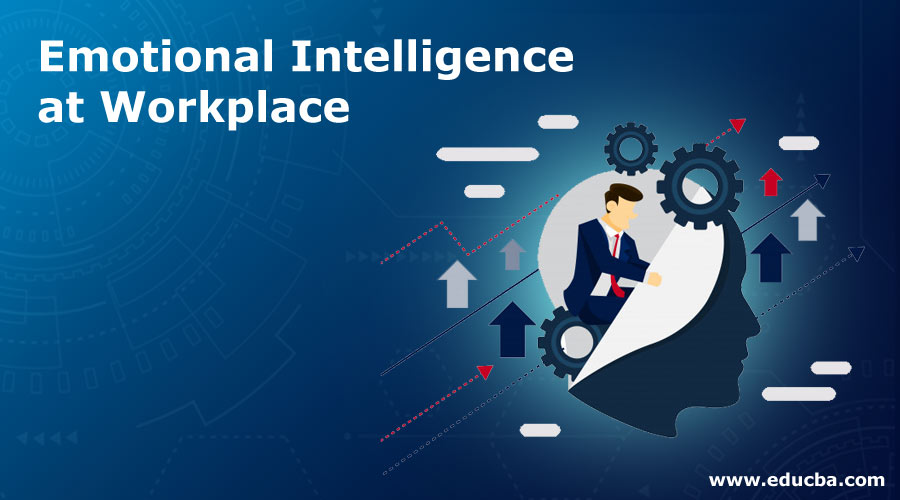
Introduction to Emotional Intelligence at Workplace
Emotional Intelligence, Emotional Leadership, Emotional Quotient, and Emotional Intelligence Quotient are defined as an individual’s competence to recognize, perceive, comprehend, and conduct their feelings and use emotional information to analyze one’s Emotional Intelligence at the workplace towards the destined goal. Emotional intelligence enables employees to differentiate between emotions when they empathize with their coworkers and have deep conversations about their relationships with their significant other. It allows us to communicate with others and lead a more well-balanced and happy life. It not only allows the employees to connect with fellow workers but also helps the organization present a clear picture of the fitment of the individual irrespective of their qualifications. This piece will discuss emotional intelligence, its principles, importance, benefits, usage, and workplace cultivation.
Principles of Emotional Intelligence
There are five pillars of Emotional Intelligence; on these pillars, a person can be evaluated when hiring.
- Self-Awareness: Defined as “the ability to decode one’s emotion.” If a person is capable of regulating their emotion is usually better at handling constructive criticism.
- Self-Regulation: Defined as “the ability to regulate one’s emotion.” If a person manages their emotion and expresses it appropriately and tactfully, then they are less likely for an emotional outburst.
- Motivation: Defined as “an inner force that drives to work towards satisfaction and accomplishment.” Emotionally Intelligent people are self-motivated, and they are usually optimistic and resilient.
- Empathy: Defined as “the ability to connect with the emotions of other people.” This does not mean showing sympathy or any sort of agreement with their behavior; it’s just that you can understand a thing from their perspective on a more professional front.
- Social Skills: Defined as “the ability to interact with peer group to fulfill each other needs and demands.” This skill is by default present in people with Emotional Intelligence and generally enjoy and respect others’ presence.
Emotional intelligence is equally essential for employees, managers, and organizational leaders to work toward the organization’s goal and meet the workers’ needs.
Benefits
Emotional intelligence is extremely important and beneficial for an organization. Here’s how a highly emotionally intelligent person can work effectively and efficiently toward the organization’s goal:
- Team-Work & Office Environment: People with higher EQ generally communicate better, so they share ideas and are open to others’ ideas. Such employees are great team players and are more likely to be trusted with their ideas and inputs. They are respectful and thoughtful of their coworkers, and such a situation is ideal for an employer and an employee. Such a work environment boosts the workers’ morale and, as a result, reflects in their performance.
- Adapting to Changes: Change is the only constant, which is the truth every organization should consider for improvement. Every company undergoes some changes, and some employees do not welcome such changes openly, as it is human nature to struggle with changes.
However, emotionally intelligent employees embrace changes with open arms, adjust quickly, and grow alongside the company. This trait always works in favor of the company’s growth.
- Time Management: In any business, deadlines can cause frustration and divide the management and employee. Here comes the role of time management, and employees with the trait of emotional intelligence can manage their time more efficiently and maximize their productivity. They know how to prioritize tasks and deliver in less time.
- Leadership Capabilities: A team under the supervision of an emotionally intelligent leader makes a huge difference in emotional intelligence at the workplace. There is a sense of respect among the employees. Such employees are the company leaders in the making.
- Step Ahead: Hiring emotionally intelligent employees can help a company to stand out in the crowd of businesses. While some companies will be struggling for team-work and self-motivated employees, on the other hand, your company will have a dream team comprising dream employees. So realizing the importance of Emotional Intelligence at a nascent stage is beneficial for any company. And this is a high time when tumultuous businesses are arising every day to take hold of the essence of EQ and add it to their hiring process.
Cultivate a Culture of Emotional Intelligence
The key to a productive business is to strip off the preconceived notion about the management or a boss and set perceptions about their emotional intelligence. Nowadays, employees look for respect and value and not a best friend in a boss.
So, companies should practice emotional intelligence like other technical and soft skills, where employees and managers can work together to achieve their emotional intelligence.
This can be performed by setting some goals such as below:
- Identify emotional trigger points and discuss them with teammates
- Plan a get-together with coworkers
- Be approachable
- Pay attention during the discus
- Avoid complaining, no matter what
After setting the goals, ice-breaking sessions are extremely important; this will need encouragement and maybe a little awkward at first, but things will become comfortable once the discussion starts soon.
All of the above suggestions are intuitive, like self-awareness, treating people with respect, etc., but apart from this, understanding and implementing emotional intelligence in the workplace needs a lot of practice. Emotional intelligence always begets more emotional intelligence; the more emotional intelligence the employee and the employer have, the more likely they are to succeed. One should always keep practicing emotional intelligence; it plays a vital role in one’s well-being and success at the workplace.
Recommended Articles
This has been a guide to Emotional Intelligence at the workplace. Here we discuss the Concept, Culture, Benefits, and Principles. You can also go through our other suggested articles to learn more –
